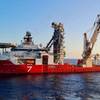Britain's BG Plc secured rights to deliver liquefied natural gas (LNG) through one of only two functioning import terminals serving booming U.S. energy markets. The UK gas producer will have use of 80 percent of capacity at CMS Energy's Lake Charles, La., facility from January 2002. It will have use of total capacity from September 2005 after a contract ends with an existing customer.
Financial terms were not disclosed. BG Chief Executive Frank Chapman would only say that the deal involved payment of a "fixed annual fee" that will rise in 2005 to reflect the higher capacity used.
But it is likely that BG fought off some stiff competition for the right to deliver LNG at a cost that in recent months has been less than half the delivered price of piped natural gas in a tight United States market.
Longer term, indigenous U.S. gas production is in steep decline, and piped gas from Alaska is seen by experts as up to a decade away.
LNG receiving capacity is in very short supply however, and even after two mothballed plants come back into operation LNG will be supplying only about four percent of the market. CMS's Lake Charles has a daily capacity send-out of 630 million standard cubic feet (mmcf) of gas. It plans to expand this by 300 mmcf but this extra capacity is not part of the BG deal.
Cabot LNG, a unit of Belgian energy services company Tractebel, operates the only other active U.S. LNG receiving terminal at Everett in Massachussetts and also has an expansion plan. There are also plans to take two others out of mothballs next year.
BG is a gas-rich exploration and production company with no existing LNG receiving capacity of its own, but whose strategy is to become an "integrated" company exploiting gas profits beyond the production stage through pipeline ownership, trading, power stations and LNG.
LNG is natural gas deep frozen until it liquefies at a tiny fraction of its volume for shipment in special tankers to regasification plants like CMS's.
The industry is booming worldwide as natural gas becomes the global fuel of choice and while pipeline construction is often too slow or to difficult, but there is a three-year backlog for new LNG tanker delivery and local resistance in places to the construction of receiving terminals. - (Reuters)
Sponsored Content
Innovative Hull Maintenance: Profitable & Green

Subscribe for
Maritime Reporter E-News
Maritime Reporter E-News is the maritime industry's largest circulation and most authoritative ENews Service, delivered to your Email five times per week












